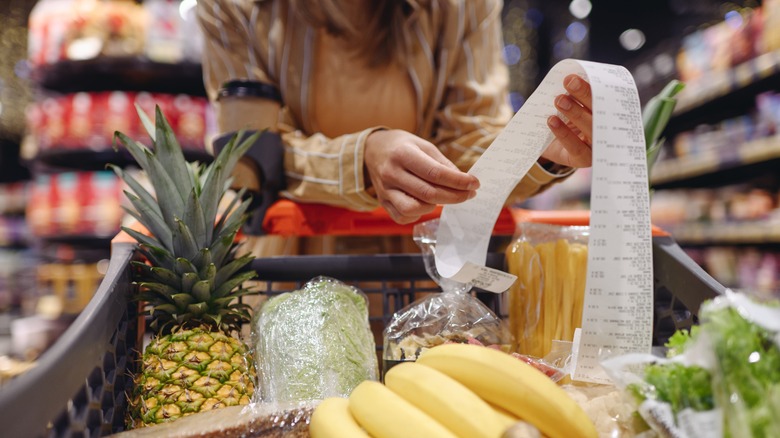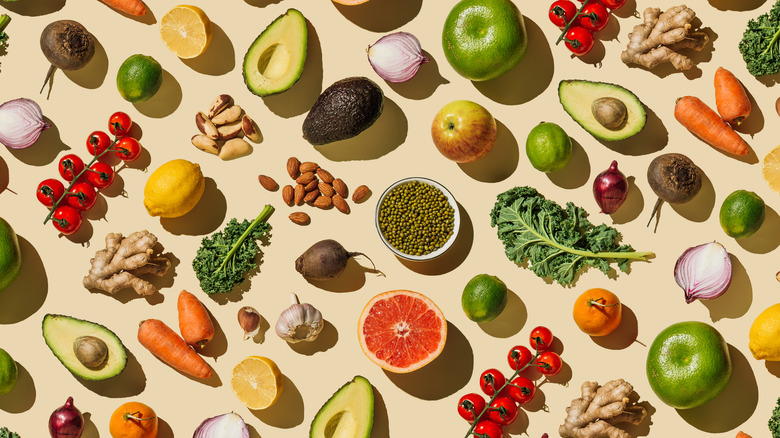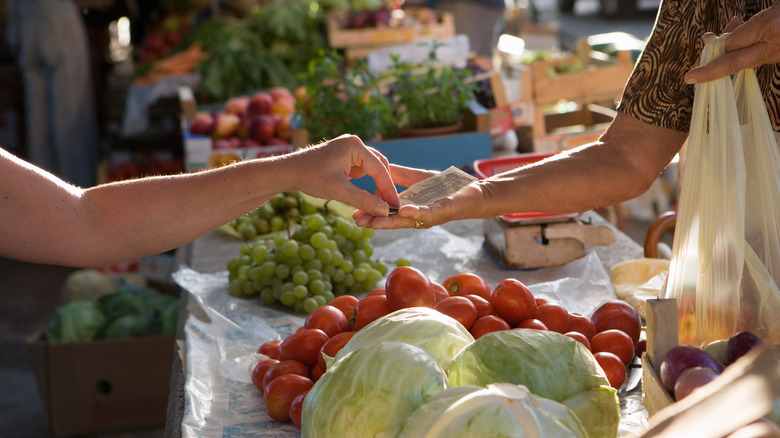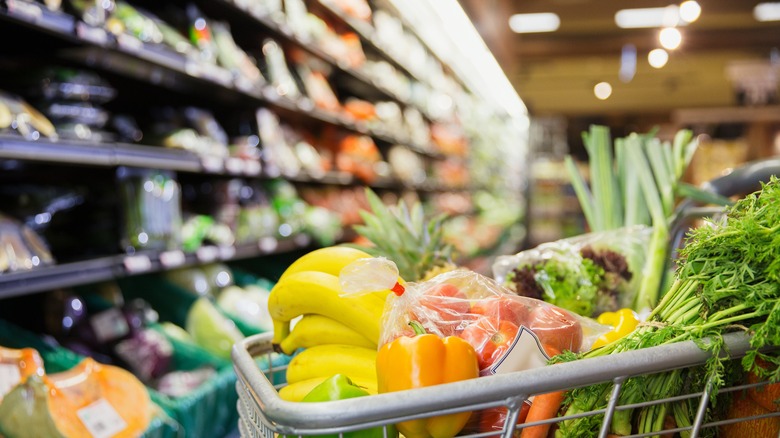How To Avoid Overbuying Groceries
We may receive a commission on purchases made from links.
The price of food has increased by 28% since 2019, with items like eggs, beef, and wheat seeing some of the highest spikes in prices. When you do head to the store, it's more important than ever to keep your spending in check and only buy what you actually need. Avoiding overbuying groceries will save you money, and it's also better for the environment; consumer food waste accounts for 10% of global greenhouse gas emissions.
Planning ahead and making a well-calculated grocery list is a surefire way to keep your spending in check. It's too easy to get distracted by shiny fruits and new packaged products as you stroll through aisles, so it may take some willpower on your end to stick to the list. If you want some flexibility, bring your list, and allow yourself to try one or two new items that catch your eye each week. Sale items may be tempting to throw in the cart, but the savings won't even really matter if the food doesn't get eaten up.
Don't shop when you're hungry as this sets even the most strong-willed up for failure. In general, science shows that an empty stomach negatively affects decision-making. In fact, a 2019 study found that hungry shoppers are more likely to give into even non-food impulse buys.
How to make a good grocery list
If you're stuck on how to make a grocery list that is good for you and your wallet, separate your list into different food groups: fresh produce, protein, dairy or dairy alternatives, grains, and extras (such as oil, sweeteners, snacks, etc.). For more guidance, try the 5-4-3-2-1 organizational technique. Basically, each grocery list should feature five vegetables, four fruits, three proteins, two sauces or spreads, and a grain. Give yourself a little flexibility to add in a dessert or snack as well.
What exactly should you choose for these categories? Most of us know the foods and meals we eat regularly in our diets — such as granola and yogurt for breakfast, or avocado and bread for lunch — so it's good to keep ingredients for these meals and snacks stocked in the house. These items are almost always guaranteed to be eaten up, reducing the risk of wasted money and food. It might sound boring, but we are creatures of habit that tend to gravitate towards the same foods and meals.
Instead, save the more exciting meals for eating out or planning a specific recipe. Choose a recipe you'd like to make and write a list of all the ingredients you need for it. Before stopping by the store, cross out the items you already have at home. Better yet, try to pick out a recipe that makes use of ingredients that need to be used soon.
The substitution technique for reducing ingredients
Eating a variety of home-cooked meals is very satisfying, but this often results in buying specific ingredients for each meal. With the right planning, it's possible to stretch these less versatile products into several meals, like making a few Mexican-inspired dishes throughout the week after purchasing ingredients like cilantro, tortillas, salsa, and queso fresco.
It's also possible to be creative with ingredient swaps so you're not stuck with a half-finished tub of sour cream that inevitably gets tossed. If a recipe calls for lime juice, but you only have lemon juice, use what you have if it makes sense. Greek yogurt can work as sour cream, and dry herbs are fine instead of fresh, especially if they'll be cooked anyway. Try to invest in shelf-stable versions of ingredients as well, like buying buttermilk powder instead of the more perishable fresh buttermilk.
Remember that ingredients such as fruit, vegetables, grains, and cheese are quite versatile. A cobbler with blueberries instead of blackberries will still be delicious, and a soup that calls for parsnip would be just fine with carrot instead. Don't feel the need to run out to the store for one specific ingredient, unless it's crucial to the recipe. Using up the ingredients on hand saves you money, plus it teaches you how to be more creative in the kitchen.
Make more frequent grocery trips
Buying only exactly what you need can be tricky if you only plan on going to the store once a week. Sure, it's tempting to stock up and buy items "just in case." However, if it's feasible with your schedule and gas budget, making multiple trips throughout the week can actually be helpful for your shopping habits. Admittedly, multiple trips can present multiple opportunities to stray from the grocery list, but with practice, your shopping trips can become laser focused.
This concept is also sometimes referred to as the "European shopping method." In European countries, it's more common for people to frequently stop by a market, grocer, or a handful of specialty stores to gather up daily ingredients, rather than weekly ones. This intentional method of shopping can be more time consuming but ensures that you truly only buy the groceries you'll use that day.
This method is particularly great for foods that tend to go bad first, like leafy greens, fresh produce, fish, and bread. Another bonus is that the food will taste fresher when you buy it closer to when you'll eat it. A food waste hack for your fridge is to keep these particular food items, the ones that will go bad quickly, in the front and always visible.
When a bigger grocery haul makes sense
There are certainly situations where doing a bigger grocery haul makes sense. Whether you're shopping for larger family dinners, loved ones coming to visit, or holiday parties, it's completely possible to keep your spending in check. Stick with your list and a menu for family dinners and holiday gatherings, allowing for a bit of flexibility to accommodate for personal preferences or dietary restrictions. If you find yourself buying a cousin's favorite BBQ sauce or vegan cheese for a niece, plan how you'll use up these items once they're gone.
Kitchen staples such as olive oil, flour, rice, sugar, pasta, and beans will need to be replenished every so often and may result in a larger grocery haul. Take note of what items are running low and plan a trip specifically to restock the staples. It's better to be sure of what you need rather than guessing at the store and ending up with three bags of black beans that will end up gathering dust in the pantry. Kitchen staples that are stored in the pantry have a much longer shelf life than fresh produce, fish, and meats, so it's okay to have a small reserve. Be sure to store properly in airtight containers, like these, so the dry goods don't go stale or spoil faster than expected.




